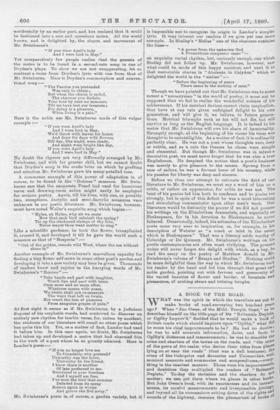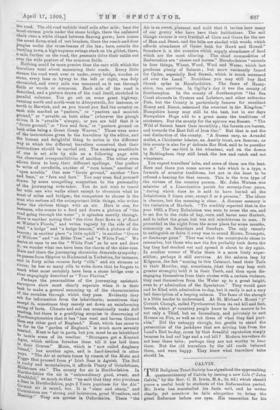A BOOK OF THE ROAD.
WHAT was the spirit in which the travellers set out t° make books of road-surveying two hundred years ago P When " Jno Owen, of the Midd: Temple, Gent," as be describes himself on the title-page of his "Britannia Deplete: or Ogilby Improv'd," decided that he would make a book ?; British roads which should improve upon " Ogilby," what did he mean his chief improvements to be ? He had no doubts; he was to add accurate information, dates, and facts t° Ogilby's distances and measurements ; he was to describe tbe arms and charters of the towns on the roads, and "the law° of the peers of the realm who derive their titles from plsees lying on or near the roads" (that was a dull business), arms of the bishoprios and deaneries and Universities, WO succinct accounts and summaries and eonspendiums,—esert thing in the exacteat manner. Those were hie improvement!' and doubtless they multiplied the readers of " Brits/el Depicts.." To-day the stutistios and the charters do e° matter; we can get them where we plalklie in other book!' But John Owen's book, with its exactnessea and Re inelso' =saes, its careful measurements and irreepousible jottinge4i and beyond all its unconscious setting down of the sights iU sounds of the highway, remains, the pleaeautest of book.
the road. The old road unfolds itself mile after mile; here the trout-stream purls under the stone bridge, there the unfenced chalk runs a white riband between framing gorse; here comes the scent down-wind of wet bracken, there the coach-and-four jangles under the cross-beams of the inn ; here, outside the bustling town, a highwayman swings stark on hie gibbet, there, a mile further on the road, the .peasants drive their cattle out over the wide pasture of the common fields.
Nothing could be more precise than the care with which the travellers went about measuring their roads. Every little stream the road went over or under, every bridge, wooden or stone, every lane or byway to the left or right, was duly chronicled, and every mile was measured as it ran through fields or woods or commons. Each side of the road is described, and a picture drawn of the road itself, stretched in parallel (*lamas. You go out on some great highway, running north and north-west to Aberystwith, for instance, or north to Berwick, and as you travel you find the country on each side marked as "pasture," or "pasture and moorish ground," or " arrable on both sides" (wherever the plough drives it is " arrable " always); or you are told that it is " furzie ground," or "furs and fern," or "pasture ground on both aides being a Great Coney Warren." Those were some of the instructions given to the travellers by the editor, and the human and delightful thing to notice is the different Way in which the different travellers conceived that their instructions should be carried out. The unseeing exactitude of one is set side by side on a following page with the observant irresponsibilities of another. The editor even 'allows them to keep their different. spellings. One prefers to write of cornfields, another of "corn laines," another of "Open arrable." One sees " furzie ground," another "furs and fenn," or "furs and fern." You may even find yourself drawn by some compelling magnetism to the personality of the journeying note-taker. You do nob wish to travel far with one who walks silent except to chronicle what he must of miles and bridges; the companion to choose is the Man who notices all the unimportant little things, who writes down the obvious things with an air. Here is one, for lintel:ice, who comes to a ford and draws a picture of "the road going through the water " ; it splashes merrily through, /fere is another noting that "the river Sour flows in ye Road at Winter's Floods," and writes vaguely by the side of the ,road "a hedge" and "a hedge beacon," with a picture of the "aeon; in another place "a little uphill"; in another "Grove of Willows" and "an Elder Tree" and "a White Post." We desire at once to see the " White Post" as he saw and drew it; we wonder what can have been the charm of the elder-tree. ]lere and there the journeying chronicler demands sympathy ; le passes from Skipton to Richmond in Yorkshire, for instance, and in forty miles crosses forty "rills" and six streams or rivers; he has so many rills to write down that he forgets to Mark what must certainly have been a stone bridge over a river engagingly described as "Your Fluvius." Perhaps the personalities of the journeying assistant- Surveyors show most clearly separate when it is their task to make a general summing up of the characteristics of the counties through which they pass. Evidently they ask for information from the inhabitants; sometimes they accept it, sometimes they merely set down an uninforining String of facts.. Climate and soil can occasionally make dull rea"diag, but there is a gratifying surprise in discovering of Northamptonshire that it has "less want and barren Ground ,thall any other part of England." Kent, which has come to °a for us the "garden of England," is much more severely t,avated. Kent is fair in parts, but you must be an inhabitant tackle some of its weather. "Strangers get a Kentish Ague, which seldom forsakes them till it has laid them lin their Graves." Mona, which is " now called Anglesey ..41141d, has another ague, and is hard-hearted in other ;aye. "The Air at certain times by reason of the Mists and °Ra that proceed from y' Irish Seas is Aguish. The Soil . and mountainous, it affords Plenty of Grindstones, V:illstottes etc." The county for air is Hertfordshire. In ortfordshi re the air is "extraordinary good, sweet, and eliftlifttl," so much so that "tie said that they who purchase !beat in Hertfordshire, pays 2 Years purchase for the Air." t._lotn!sh air is sound, too. It is "clear and sharp," and e_ornishmen are "strong and boisterous, great Wrestlers, and Iteidthy." They are quieter in Oxfordshire. There "the Air is so sweet, pleasant and mild that it invites here many of our gentry who have hero their habitations. The Boil though various is very fruitfull ef Corn and Grass for the use of Man and Beast, and the hills are shaded with woods, which affords abundance of Game both for Hawk and Hound." Somehow it is the counties which supply abundance of food which are the most alluring. The chief commodities of Radnorshire are "cheese and horses." Herefordshire "exceeds in four things, Wheat, Wood, Wool and Water, which last produces plenty of Salmon ; but more eminently famed for Cyder, especially Red Streak, which is much esteemed all over the Land." Doubtless you may still buy Red Streak cyder in Herefordshire. The fame of Hamp- shire, too, survives. In Ogilby's day it was the county of Southampton. In the county of Southampton "the Sea Coast abounds in Oysters and Lobsters, and other saltwater Fish, but the County is particularly famous for excellent Honey and Bacon, esteemed the sweetest in the Kingdom." Hampshire honey may still be the best, but in our days Hampshire Hogs add to a great name the traditions of cricketers. But the county for the epicure was Sussex. "The Wild of Sussex bears Oats incredibly ; the forests are barren, and towards the East full of Iron Oar." But that is not the real distinction of the county. "A Sussex carp, an Arundel mullet, a Chichester lobster, an Anerly trout, are famous; as this county is also for ye delicate Ear Bird, said to be peculiar to it." The ear-bird is the wheatear, and on the downs by Rottingdean they still break the law and catch and eat wheatears.
You expect travellers' tales, and some of them are the best. Here and there you come across a tale which is a type, a formula of country traditions, but not in the least to be refused a hearing for that reason. This is the true type of • the virtues of the country parson. Mr. John Watson was minister of a Lincolnshire parish for seventy-four years, "during which time he is said to have buried all the Inhabitants 3 times over, except 3 or 4 persons." The idiom is obscure, but the meaning is clear. A dimmer memory is the visitation of Harlech. "Tin credibly reported that in the year 1692, a Fiery Exhalation was seen to cross the sea, and to set fire to the ricks of hay, corn, and barns near blarlech, and to infect the grass, but was not mischievous to men. It proceeded in the night from the same place for some mouths, commonly on Saturdays and Sundays. The only remedy to extinguish or drive it away was to sound Horns, Trumpets, or discharge guns." That was what the countryside chose to remember, but those who saw the fire probably took down the bay they had stacked wet and spread it about to dry again. In another corner of Wales there is a more lively super- stition; perhaps it still survives. At the salmon leap by Kilgarou, the fish "coming to this Cataract, bend their Tails
to their Mouths; nay, sometimes, (that they may leap with greater strength) hold it in their Teeth, and then upon dis- engaging themselves from their circles with a certain violence, they cast themselves from the Water up to a great height,
even to ye admiration of the Spectators." They would gaze and be filled with admiration to-day, but it really is not a very bad description of a leaping salmon. The fame of the °hough is a little harder to understand. At St, Michael's Mount "y Cornish °hough, called Pyrrh000ras from its red bill and feet, breeds, which ye eountrey people know to their sorrow to be not only a Thief, but an Incendiary, and privately to sett Houses on Fire, as well as rob them of what they fuad. port- able." Did the unhappy chough, too gentle to stand the persecution of the jackdaws that are driving him from the Land's End to-day, come by that dreadful reputation simply because he had red legs and a red bill P Modern travellers do not hear these tales ; perhaps they are not worthy to hear them. But the old travellers by the old roads believed them, and were happy. They knew what travellers' tales should be.







































 Previous page
Previous page